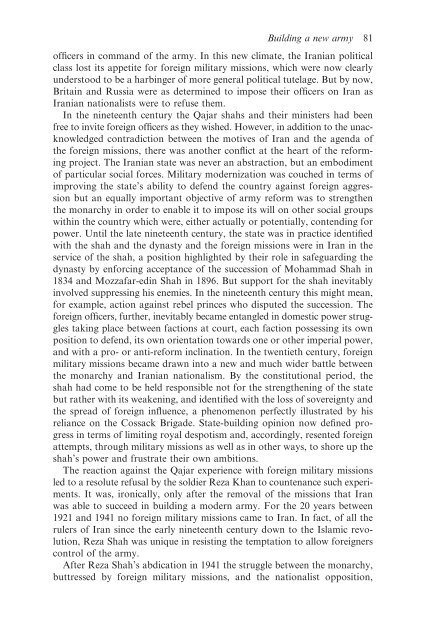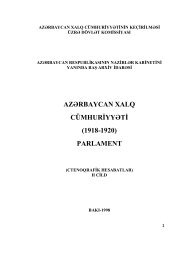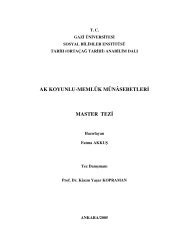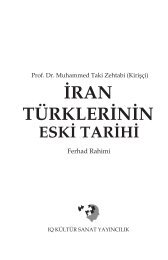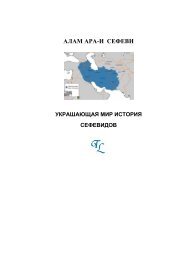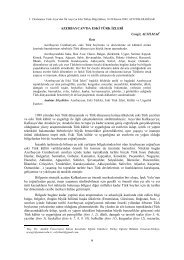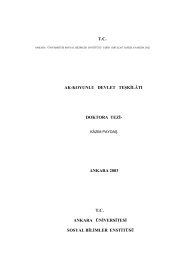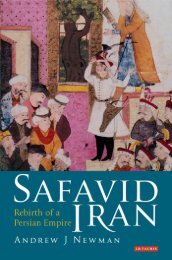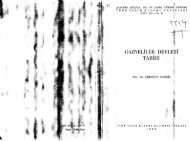Build<strong>in</strong>g a new army 81officers <strong>in</strong> comm<strong>and</strong> of the army. In this new climate, the Iranian politicalclass lost its appetite for foreign military missions, which were now clearlyunderstood to be a harb<strong>in</strong>ger of more general political tutelage. But by now,Brita<strong>in</strong> <strong>and</strong> Russia were as determ<strong>in</strong>ed to impose their officers on Iran asIranian nationalists were to refuse them.In the n<strong>in</strong>eteenth century the <strong>Qajar</strong> shahs <strong>and</strong> their m<strong>in</strong>isters had beenfree to <strong>in</strong>vite foreign officers as they wished. However, <strong>in</strong> addition to the unacknowledgedcontradiction between the motives of Iran <strong>and</strong> the agenda ofthe foreign missions, there was another conflict at the heart of the reform<strong>in</strong>gproject. The Iranian state was never an abstraction, but an embodimentof particular social forces. Military modernization was couched <strong>in</strong> terms ofimprov<strong>in</strong>g the state’s ability to defend the country aga<strong>in</strong>st foreign aggressionbut an equally important objective of army reform was to strengthenthe monarchy <strong>in</strong> order to enable it to impose its will on other social groupswith<strong>in</strong> the country which were, either actually or potentially, contend<strong>in</strong>g forpower. Until the late n<strong>in</strong>eteenth century, the state was <strong>in</strong> practice identifiedwith the shah <strong>and</strong> the dynasty <strong>and</strong> the foreign missions were <strong>in</strong> Iran <strong>in</strong> theservice of the shah, a position highlighted by their role <strong>in</strong> safeguard<strong>in</strong>g thedynasty by enforc<strong>in</strong>g acceptance of the succession of Mohammad Shah <strong>in</strong>1834 <strong>and</strong> Mozzafar-ed<strong>in</strong> Shah <strong>in</strong> 1896. But support for the shah <strong>in</strong>evitably<strong>in</strong>volved suppress<strong>in</strong>g his enemies. In the n<strong>in</strong>eteenth century this might mean,for example, action aga<strong>in</strong>st rebel pr<strong>in</strong>ces who disputed the succession. Theforeign officers, further, <strong>in</strong>evitably became entangled <strong>in</strong> domestic power strugglestak<strong>in</strong>g place between factions at court, each faction possess<strong>in</strong>g its ownposition to defend, its own orientation towards one or other imperial power,<strong>and</strong> with a pro- or anti-reform <strong>in</strong>cl<strong>in</strong>ation. In the twentieth century, foreignmilitary missions became drawn <strong>in</strong>to a new <strong>and</strong> much wider battle betweenthe monarchy <strong>and</strong> Iranian nationalism. By the constitutional period, theshah had come to be held responsible not for the strengthen<strong>in</strong>g of the statebut rather with its weaken<strong>in</strong>g, <strong>and</strong> identified with the loss of sovereignty <strong>and</strong>the spread of foreign <strong>in</strong>fluence, a phenomenon perfectly illustrated by hisreliance on the Cossack Brigade. State-build<strong>in</strong>g op<strong>in</strong>ion now def<strong>in</strong>ed progress<strong>in</strong> terms of limit<strong>in</strong>g royal despotism <strong>and</strong>, accord<strong>in</strong>gly, resented foreignattempts, through military missions as well as <strong>in</strong> other ways, to shore up theshah’s power <strong>and</strong> frustrate their own ambitions.The reaction aga<strong>in</strong>st the <strong>Qajar</strong> experience with foreign military missionsled to a resolute refusal by the soldier Reza Khan to countenance such experiments.It was, ironically, only after the removal of the missions that Iranwas able to succeed <strong>in</strong> build<strong>in</strong>g a modern army. For the 20 years between1921 <strong>and</strong> 1941 no foreign military missions came to Iran. In fact, of all therulers of Iran s<strong>in</strong>ce the early n<strong>in</strong>eteenth century down to the Islamic revolution,Reza Shah was unique <strong>in</strong> resist<strong>in</strong>g the temptation to allow foreignerscontrol of the army.After Reza Shah’s abdication <strong>in</strong> 1941 the struggle between the monarchy,buttressed by foreign military missions, <strong>and</strong> the nationalist opposition,
82 Stephanie Cron<strong>in</strong>determ<strong>in</strong>ed on their removal, resumed <strong>in</strong> earnest. With<strong>in</strong> a greatly weakenedpolitical context, the new power <strong>in</strong> Iran, the United States, was once aga<strong>in</strong>able to <strong>in</strong>sist on missions of its officers serv<strong>in</strong>g <strong>in</strong> the country. 78 As <strong>in</strong> thelate <strong>Qajar</strong> period, so now, it was the shah, Mohammad Reza (1941–1979)who accepted this imposition aga<strong>in</strong>st nationalist op<strong>in</strong>ion, <strong>and</strong> sufferedaccord<strong>in</strong>gly. Once aga<strong>in</strong>, as <strong>in</strong> the years before 1921, the foreign military missions,although <strong>in</strong>tended to further imperial objectives, <strong>in</strong> fact provoked <strong>in</strong>tenseIranian resentment, constitut<strong>in</strong>g a factor of major significance <strong>in</strong> br<strong>in</strong>g<strong>in</strong>gabout another dramatic political rupture, the revolution of 1979.Notes1 Where countries fell under direct European control, the process of military modernization<strong>and</strong> state-build<strong>in</strong>g took place with<strong>in</strong> a totally different configuration.2 Although the role of military reform <strong>in</strong> generat<strong>in</strong>g a dynamic for a wider statebuild<strong>in</strong>gagenda has long been acknowledged, studies of the new armies ofthe n<strong>in</strong>eteenth-century Middle East <strong>and</strong> North Africa are few. Among the mostimportant are Stanford J. Shaw, “The Orig<strong>in</strong>s of Ottoman Military Reform:The Nizam-i Cedid Army of Sultan Selim III”, Journal of Modern History 37/3(1965): 291–305; L. Carl Brown, The Tunisia of Ahmed Bey (Pr<strong>in</strong>ceton: Pr<strong>in</strong>cetonUniversity Press, 1974); M. E. Yapp, “The Modernization of Middle Eastern Armies<strong>in</strong> the N<strong>in</strong>eteenth Century: A Comparative View”, <strong>in</strong> M. E. Yapp <strong>and</strong> V. J. Parry,eds, <strong>War</strong>, Technology <strong>and</strong> Society <strong>in</strong> the Middle East (London: Oxford UniversityPress, 1975); Wilfrid J. Rollman, “The ‘New Order’ <strong>in</strong> a Pre-Colonial MuslimSociety: Military Reform <strong>in</strong> Morocco, 1844–1904”, PhD diss., University ofMichigan, 1983; Khaled Fahmy, All the Pasha’s Men: Mehmed Ali, his Army <strong>and</strong>the Mak<strong>in</strong>g of Modern Egypt (Cambridge: Cambridge University Press, 1997).Recently attention has turned away from the reform<strong>in</strong>g westerniz<strong>in</strong>g elites <strong>and</strong>refocused on military modernization as experienced “from below”. See Fahmy, Allthe Pasha’s Men; Erik J. Zürcher, ed., Arm<strong>in</strong>g the State: Military Conscription <strong>in</strong>the Middle East <strong>and</strong> Central Asia (London <strong>and</strong> New York: I. B. Tauris, 1999);Odile Moreau <strong>and</strong> Abderrahmane el Moudden, eds, “Réforme par le haut,réforme par le bas: La modernization de L’armée aux 19e et 20e siècles”,Quaderni di Oriente Moderno (special issue) (Rome, 2004). Surpris<strong>in</strong>gly, <strong>in</strong> thelight of the amount of material, memoirs <strong>and</strong> diplomatic correspondence whichthey generated, the European missions have attracted little <strong>in</strong>terest. Two articleslook at the German missions to the Ottoman Empire; Ulrich Trumpener, “Limanvon S<strong>and</strong>ers <strong>and</strong> the German-Ottoman Alliance”, Journal of ContemporaryHistory 1/4 (October 1966): 179–92; Glen W. Swanson, “<strong>War</strong>, Technology <strong>and</strong>Society <strong>in</strong> the Ottoman Empire from the Reign of Abdulhamid II to 1913:Mahmud Sevket <strong>and</strong> the German Military Mission”, <strong>in</strong> Yapp <strong>and</strong> Parry, eds, <strong>War</strong>,Technology <strong>and</strong> Society, pp. 366–85. Morocco’s <strong>in</strong>terest<strong>in</strong>g experiment withan Ottoman mission is dealt with by Abderrahmane el Moudden, “Look<strong>in</strong>gEastward: Some Moroccan Tentative Military Reforms with Turkish Assistance(18th–early 20th centuries)”, Maghreb Review 19/3–4 (1994): 237–45. Iran hassuffered particularly from this lack of scholarly <strong>in</strong>terest. There is no comprehensivestudy of the military or military reform <strong>in</strong> n<strong>in</strong>eteenth-century Iran. For anoverview see J. Calmard, “Les Réformes Militaires sous les <strong>Qajar</strong>s (1795–1925)”,<strong>in</strong> Y. Richard, ed., Entre l’Iran et l’Occident (Paris, Maison de la sciences del’homme, 1989). A small number of older <strong>Persia</strong>n works also provide surveys.See Jahangir Qa’im-Maqami, Tahavvulat-i Siyasi-yi Nizam-i Iran (Tehran, 1326);Jamil Quzanlu, Tarikh-i Nizam-i Iran, 2 vols (Tehran, 1315). The late Nasir-al D<strong>in</strong>
- Page 2 and 3:
War and Peace in Qajar PersiaPersia
- Page 4 and 5:
War and Peace inQajar PersiaImplica
- Page 6 and 7:
ContentsList of figuresContributors
- Page 8 and 9:
Figures5.1 Omani enclaves 1305.2 Ar
- Page 10 and 11:
Contributor listMansoureh Ettehadie
- Page 12:
AcknowledgementsThis volume grew ou
- Page 15 and 16:
2 Roxane Farmanfarmaianrepresented
- Page 17 and 18:
4 Roxane Farmanfarmaianchapter in t
- Page 19 and 20:
6 Roxane FarmanfarmaianThus, two si
- Page 21 and 22:
8 Roxane Farmanfarmaiangaining grea
- Page 23 and 24:
10 Roxane Farmanfarmaiantough deals
- Page 25 and 26:
12 Roxane FarmanfarmaianIranian geo
- Page 27 and 28:
14 Peter W. Averyin Shiraz and cont
- Page 29 and 30:
16 Peter W. Averybut the invasion w
- Page 32:
Part IWar
- Page 35 and 36:
22 Manoutchehr M. Eskandari-Qajarth
- Page 37 and 38:
24 Manoutchehr M. Eskandari-Qajarap
- Page 39 and 40:
26 Manoutchehr M. Eskandari-Qajarmi
- Page 41 and 42:
28 Manoutchehr M. Eskandari-Qajarth
- Page 43 and 44: 30 Manoutchehr M. Eskandari-Qajardo
- Page 45 and 46: 32 Manoutchehr M. Eskandari-QajarIn
- Page 47 and 48: 34 Manoutchehr M. Eskandari-Qajarco
- Page 49 and 50: 36 Manoutchehr M. Eskandari-QajarTh
- Page 51 and 52: 38 Manoutchehr M. Eskandari-Qajarth
- Page 53 and 54: 40 Manoutchehr M. Eskandari-Qajarth
- Page 55 and 56: 42 Manoutchehr M. Eskandari-Qajarop
- Page 57 and 58: 44 Manoutchehr M. Eskandari-Qajarbe
- Page 59 and 60: 46 Manoutchehr M. Eskandari-Qajarva
- Page 61 and 62: 48 Stephanie Cronincapacity and res
- Page 63 and 64: 50 Stephanie Croninforces of the es
- Page 65 and 66: 52 Stephanie CroninPART ONE: THE QA
- Page 67 and 68: 54 Stephanie Croninprincipally on h
- Page 69 and 70: 56 Stephanie CroninThe French offic
- Page 71 and 72: 58 Stephanie CroninEuropean alignme
- Page 73 and 74: 60 Stephanie Croninthe authorities
- Page 75 and 76: 62 Stephanie Croninin the revolutio
- Page 77 and 78: 64 Stephanie Croninof power and sta
- Page 79 and 80: 66 Stephanie Croninliving and the m
- Page 81 and 82: 68 Stephanie Croninconsequences for
- Page 83 and 84: 70 Stephanie Croninrevolution was a
- Page 85 and 86: 72 Stephanie CroninNew British miss
- Page 87 and 88: 74 Stephanie CroninBrigade to a Div
- Page 89 and 90: 76 Stephanie Croninwithout the sove
- Page 91 and 92: 78 Stephanie Croninaccounting devic
- Page 93: 80 Stephanie Croninbut also faced a
- Page 97 and 98: 84 Stephanie Cronin15 For a discuss
- Page 99 and 100: 86 Stephanie Cronin55 The Anglo-Rus
- Page 101 and 102: 3 The Turko-Persian War1821-1823Win
- Page 103 and 104: 90 Graham WilliamsonThe resultant w
- Page 105 and 106: 92 Graham Williamsonprovincial forc
- Page 107 and 108: 94 Graham WilliamsonThe field armyO
- Page 109 and 110: 96 Graham Williamsonnot hold out mu
- Page 111 and 112: 98 Graham Williamsonoften in arrear
- Page 113 and 114: 100 Graham Williamsonthan any desig
- Page 115 and 116: 102 Graham WilliamsonThere were ove
- Page 117 and 118: 104 Graham Williamsonone should not
- Page 119 and 120: Table 3.2 Persian regional armies (
- Page 121 and 122: 108 Graham WilliamsonIranian influe
- Page 123 and 124: 4 Social networks andborder conflic
- Page 125 and 126: 112 Vanessa MartinPersian troops on
- Page 127 and 128: 114 Vanessa Martinof comparatively
- Page 129 and 130: 116 Vanessa MartinTHE ROLE OF SOCIA
- Page 131 and 132: 118 Vanessa MartinThe Shah’s negl
- Page 133 and 134: 120 Vanessa Martinborder or any oth
- Page 135 and 136: 122 Vanessa Martin44 No. 38, 2 June
- Page 138 and 139: 5 The consolidation of Iran’sfron
- Page 140 and 141: Consolidation of Iran’s frontier
- Page 142 and 143: Consolidation of Iran’s frontier
- Page 144 and 145:
Consolidation of Iran’s frontier
- Page 146 and 147:
Consolidation of Iran’s frontier
- Page 148 and 149:
Consolidation of Iran’s frontier
- Page 150 and 151:
Figure 5.2 Arab principalities
- Page 152 and 153:
Consolidation of Iran’s frontier
- Page 154 and 155:
Consolidation of Iran’s frontier
- Page 156 and 157:
Consolidation of Iran’s frontier
- Page 158 and 159:
Consolidation of Iran’s frontier
- Page 160 and 161:
Consolidation of Iran’s frontier
- Page 162 and 163:
6 Narrowing the frontierMid-ninetee
- Page 164 and 165:
Narrowing the frontier 151witnessed
- Page 166 and 167:
Figure 6.1 The 1843 borderlands sta
- Page 168 and 169:
Narrowing the frontier 155And the S
- Page 170 and 171:
Figure 6.2 The 1850 Williams line a
- Page 172 and 173:
Narrowing the frontier 159elicited
- Page 174 and 175:
Narrowing the frontier 161travellin
- Page 176 and 177:
Narrowing the frontier 163be found
- Page 178 and 179:
Narrowing the frontier 165A similar
- Page 180 and 181:
Narrowing the frontier 167and accep
- Page 182 and 183:
Narrowing the frontier 169Perhaps t
- Page 184 and 185:
Narrowing the frontier 171By this s
- Page 186 and 187:
Narrowing the frontier 17346 For a
- Page 188 and 189:
Crime, security, and insecurity 175
- Page 190 and 191:
Crime, security, and insecurity 177
- Page 192 and 193:
Crime, security, and insecurity 179
- Page 194 and 195:
Crime, security, and insecurity 181
- Page 196 and 197:
8 Merchants without bordersTrade, t
- Page 198 and 199:
Merchants without frontier 185the m
- Page 200 and 201:
Merchants without frontier 187and d
- Page 202 and 203:
Merchants without frontier 189photo
- Page 204 and 205:
Merchants without frontier 191their
- Page 206 and 207:
Merchants without frontier 193In an
- Page 208 and 209:
Figure 8.1Seated, first from left:
- Page 210 and 211:
Figure 8.3Seated: Hajj Mohammad-Taq
- Page 212 and 213:
Figure 8.5 Taken in Hajj Hasan Jour
- Page 214 and 215:
Merchants without frontier 201Figur
- Page 216 and 217:
Merchants without frontier 203Studi
- Page 218 and 219:
Merchants without frontier 20516 Me
- Page 220 and 221:
Merchants without frontier 207and t
- Page 222 and 223:
Merchants without frontier 209or pu
- Page 224 and 225:
Merchants without frontier 211It ca
- Page 226 and 227:
9 The politics of concessionReasses
- Page 228 and 229:
The politics of concession 215gradu
- Page 230 and 231:
The politics of concession 217Shah,
- Page 232 and 233:
The politics of concession 219assig
- Page 234 and 235:
The politics of concession 221compa
- Page 236 and 237:
The politics of concession 223gross
- Page 238 and 239:
The politics of concession 225the B
- Page 240 and 241:
The politics of concession 227as th
- Page 242 and 243:
IndexAbbas Mirza, Crown Prince 6, 1
- Page 244 and 245:
Index 231Gulf Arabs 127-9Gwadar 136
- Page 246 and 247:
Index 233policy in Persian Gulf 131


